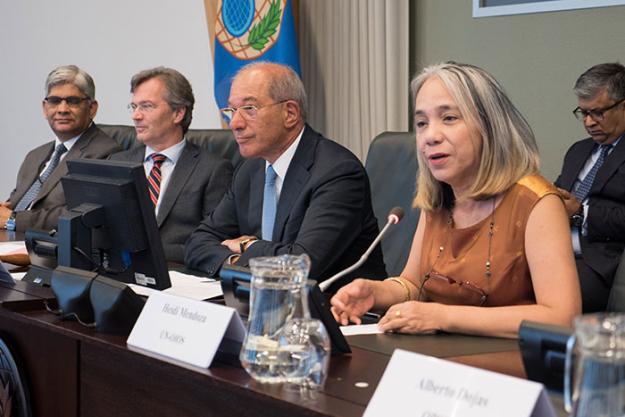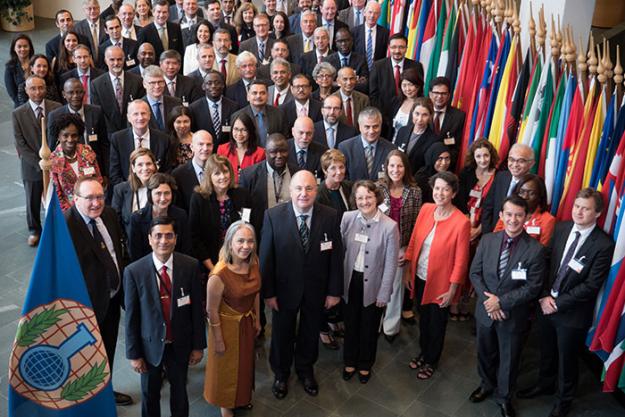
Deputy Director-General of OPCW, Hamid Ali Rao (far left), President of the Netherlands Court of Audit, Mr Arno Visser, Director-General of OPCW, Ahmet Üzümcü and UN Under-Secretary-General, Office of Internal Oversight Services, Ms Heidi Mendoza.
THE HAGUE, Netherlands – 15 September 2017– Representatives of Internal Audit Services (RIAS) with members from across the United Nations System organisations, multilateral financial institutions and other associated intergovernmental organisations discussed the latest trends in internal audit practices during an annual meeting held at the Organisation for the Prohibition of Chemical Weapons (OPCW) Headquarters in The Hague from 28- 31 August.
United Nations Representatives of Internal Audit Services (UN-RIAS) also held their annual meeting during the first two days of the Conference.
The event, organised for the first time by the OPCW, was supported by the Dutch Government and the Municipality of The Hague and aimed to promote the development and exchange of UN internal audit and oversight related practices and experience. The theme of the meeting was “Moving the Frontiers of Internal Audit”.
In his remarks, OPCW Director-General, Ambassador Ahmet Üzümcü, expounded on the important role played by internal audit in good governance and emphasised the need to develop skills for carrying out audits in emerging areas such as information technology, cybersecurity, gender-related issues, and digitisation of management processes.
The President of the Netherlands Court of Audit, Mr Arno Visser, delivered the keynote address and spoke about promoting the values that auditors worldwide share and protect such as quality, integrity and transparency.
The UN Under-Secretary-General, Office of Internal Oversight Services, Ms Heidi Mendoza and the Director of Internal Oversight at OPCW, Mr Alberto E. Dojas welcomed over 80 participants from more than 50 international organisations.

Representatives of Internal Audit Services (RIAS) with members from across the United Nations System organisations, multilateral financial institutions and other associated intergovernmental organisations
OPCW invited several speakers to address the meeting such as the Chief Executive of Dutch Accreditation Council for ISO Standards, Mr Jan van der Poel, who chaired a panel and shared his thoughts on “Accreditation, Certification and ISO-standards as tools for Quality Management in International Organisations”, while the Chairperson of the Institute of Internal Auditors Netherlands, Mr Hans Nieuwlands chaired a panel and addressed the participants on “Auditing Organisational Culture”.
The conference deliberated upon several issues that are of topical interest to the internal audit community, such as ISO standards, auditing organisational culture, audit of IT security, the role of social media in public sector internal audit, innovation and creativity in internal audit, management of self-disclosure and the role of internal audit in the implementation of the UN Sustainable Development Goals.
Background
Representatives of Internal Audit Services (RIAS) is an umbrella organisation serving as a forum to promote the development and exchange of internal audit and oversight related practices and experiences, for the coherent, efficient and cost-effective internal audit activities of the organisations of the UN System, MFI and other intergovernmental organisations.
As the implementing body for the Chemical Weapons Convention, the OPCW oversees the global endeavour to permanently eliminate chemical weapons. Since the Convention’s entry into force in 1997 – with its 192 States Parties – it is the most successful disarmament treaty eliminating an entire class of weapons of mass destruction.
Ninety-six per cent of all chemical weapon stockpiles declared by possessor States have been destroyed under OPCW verification. For its extensive efforts in eliminating chemical weapons, the OPCW received the 2013 Nobel Prize for Peace.
